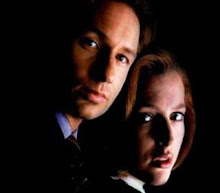
Wednesday, December 23, 2009
'The most important part of a story is the piece you don't know'

Saturday, December 19, 2009
Announcing our new hero, Barbie...

Under the Dome by Stephen King
Stephen King has gone back to a small town in Maine in his latest tome, Under the Dome. The lives of this small country town vastly change when a (glass?) dome shoots up from the ground. The physical technicalities of the dome are intriguing - air can be exchanged, but pretty much nothing else. The town is run by your basic corrupt politician, Big Jim Rennie, that sees it as his duty (we all support the team) to lead the town out of the crisis. Enter our hero, a young ex-military cook (not chef) from out-of-town, Barbie (Dale Barbara). Under the Dome has everything a good King follower will enjoy - a situational thriller, the cunning children, the offbeat hero, the strong leading females, and a slew of bad guys you just want to see crushed if you didn't feel so bad for them (okay, I still wanted to crush them). King's novels often have a literary edge and the message he has about society is clear - we're stuck on this bubble planet earth and maybe we just be a bit nicer to one another if we want to survive. There was even a bit of an environmental kicker involved, but I don't want to spoil the ending. This novel isn't filled with supernatural elements (I know some readers have problems with suspension of disbelief) so even if you're not a die-hard King fan like me, I'd still recommend Under the Dome. It's an exploration of what happens to society under pressure and that should be interesting to all of us in the modern world.
Saturday, November 7, 2009
Keep on truckin'...

Monday, October 12, 2009
Neither rain nor snow...

Chew, chewy, chew
Monday, October 5, 2009
The perfect snore........

Perfecting by Kathryn Kuitenbrouwer
Dance Kathryn!

Wednesday, September 9, 2009
A Bowl with Little Punch
Tuesday, September 8, 2009
Literally, The Bible....and it's a book!

Sunday, July 12, 2009
Ivan the Sad

Thursday, July 2, 2009
Dashing, no Dashiell

Me Tarzan, You Silly
Love in the time of Canada

Saturday, June 27, 2009
Tough Guys screw around

Thursday, June 11, 2009
These Violet Eyes are smiling...

Monday, June 1, 2009
Here, There, Neverwhere

Neverwhere by Neil Gaiman
Gaiman introduces a whole new context for the term 'London Underground' with his book Neverwhere. The story is set in the tunnels and sewers below the London. The book opens with Richard, a lawyer just beginning to make his mark, finding a scared and battered girl, Door, on the street. Instead of ignoring the girl (much to the disdain of his girlfriend Jessica) he takes her home and eases her back to health with the help of characters from the underground. Unfortunately after the incident he is no longer visible to the people of 'London Above'. He joins a quest with Door, her friend des Cabras, and their bodyguard Hunter to find her parents' murder in hopes of going home to his reality. The entire story was well written and fast paced. We see growth in all of the characters, but a larger change is seen in Richard. A common man with little passion for his life and scared of everything becomes a warrior. One of the best scenes in the story involves Richard confronting himself to discover who he is and what reality he is living in. Richard winds up talking to himself and one of the details like - he hears his friend Gary (that is really him) talking to him with the voice that is his own, and not the voice from answering machines, video cameras, or other electronic devices - the voice of what he sounds like inside his head, not outside. This is a fantastic detail that everyone can relate to. How many times have we heard ourselves recorded only to wonder - do I really sound like that?
One can't help wonder with this attention to London's homeless and poverty stricken, is Gaiman trying to push a more important agenda with this novel? The story is fantastic on it's own, but it seems to have an obvious message to us of the 'London Above' world. Maybe we should stop ignoring these people's voices in the streets and subways. Maybe they have something interesting to tell us. What are you're ideas?
Thursday, May 28, 2009
Below Hell?
South of Hell by PJ Parrish
PJ Parrish, a sister writing team, has released a new Louis Kincaid novel. While I am a big fan of authors like Jeffery Deaver and Stephan King, I wa a Louis Kincaid virgin. The book is about a tortured PI (Kincaid) and his female detective lover (Joe) trying to solve a cold case. The story starts in Florida and quickly moves to Hell, Michigan where a local detective (Jake Shockey) is trying to get some closure over a 'cold case' by any means necessary. Wrapped up in the story is a little girl (Amy), her violent father (Owen Brandt), and a possible murder (Jean Brandt). Kincaid and Joe are a good duo with lots of internal tension and I can tell from the story I'll want to go back and read some of the previous books, but the other characters don't show the same 3 dimensionality. Owen seems a bit overly violent and Amy is a bit too strong-willed to be realistic, but it was fast paced and an easy read (good weekend/beach fiction). I enjoyed Louis Kincaid, but throughout the story I didn't expect the he was only 29 years old. The book goes off the beaten track into the land of regressed memories, but doesn't completely venture into the paranormal, keeping us skeptics along for the ride.
Plot: 3 stars; Character development: 2 stars; Overall: 2.5 stars
Ripperologists Rejoice
From Hell is a mish-mash of fact and fiction graphic novel about Jack the Ripper. I'm not an Alan Moore virgin and have recently enjoyed The Watchmen and V for Vendetta (graphic novels more than the movies). The story is very interesting especially if you're a conspiracy theorist and like convoluted plots with a large range of multi-dimensional characters. This is pretty typical of Alan Moore's writing. There are often small side plots or twists in the story and learning the identity of Jack the Ripper isn't given up at the start or really the plot of the story. The characters are never flat and the pace of the story keeps you turning the pages. For all of you avid comic book readers it probably won't take you more than a weekend to finish. The vast appendices outline in detail the fact and fiction of the story and based mainly on Jack the Ripper: The Final Solution by Stephen Knight and Theo Ackland's biography of Sir William Gull. In addition, Moore adds a bit about his own becoming as a Ripperologist in a short chapter entitled Chasing the Gulls (Appendix II).
As for Campbell's work; I am less familiar. The comic is drawn in a dark style that reminds me of Bruce Timm's Batman the Animated Series and Batman Beyond. The panels are carefully constructed and many of the quotes in the comic are factual conversations. The characters are difficult to differentiate in the first few chapters (especially the vast number of women illustrated), but as you continue to read you start to notice the subtle nuances between people and they become easily identifiable.
Overall, this graphic novel is highly recommended. The storytelling of Alan Moore has yet to disappoint me and he always chooses the best artists for the story. The movie was good in it's own right, but it's only reminiscent of this work.
Plot: 3.5 stars; Character development: 3 stars; Artwork: 3 stars; Overall: 3.24 stars
Run, Rabbit, Run

Rabbit, Run by John Updike
Rabbit Run is a novel from 1960 about a 'common man' living in suburban PA. This is my first Updike book and I have a mixed review. The author has a poetic style of prose and the story is wonderfully illustrated with words. The story starts with our main character, Rabbit, a suburban father and husband, on the run from a life of responsibility. The story follows Rabbit through his feelings of doubt and 'live for the day' divulgences while feeling trapped in the suburbs with his wife and family (including in-laws). He's almost a guilty Dean Moriarty that can't decide whether to hitch a ride west in a boxcar or settle down with the wife and kids for a mundane life without meaning. I had a hard time sympathizing with Rabbit and it made the book difficult to read, to the point I'm not sure I want to read the sequels (next up - Rabbit Redux). I would probably sympathize with his wife or mistress, but they have their own smattering of faults. Rabbits wife, Janice, comes off as a nag and his mistress, Ruth, knows what she is getting into from the start. Updike develops the characters more than the plot. The entire cast has me teetering between sympathy and disgust throughout the book while the writing propels me to read the sequel. As a self-proclaimed (or admitted?) feminist, the context of 1950s small town America through Updike's 1960s eyes is disturbingly chauvinist. Rabbit is constantly forgiven for even the most reprehensible behavior while his wife is expected to harbor blame (even from her mother) for their failing marriage.
Plot: 2.5 stars; Character development: 4 stars; Overall: 3 stars
Our Hero - Mr. Decimal
 Welcome to my personal card catalog. I can never seem to get my hands on enough books. I read, I read, and I read some more. Journal articles, graphic novels, fiction, short stories, comic books, poetry, non-fiction, the cereal box...I can't seem to get enough and I can't seem to remember everything I've read. To keep better track of my books (and m opinions) I've decided to start blogging about them. I promise to write something about all of the books I read - the good, the horrible, and the boring. I'll write about famous classics, comic books, good beach books, quick mysteries, quirky novels, etc. Anything I come across I'll talk about (minus the journal articles and cereal boxes - only I find those interesting!). So welcome to The Avid Reader's Card Catalog and feel free to comment!
Welcome to my personal card catalog. I can never seem to get my hands on enough books. I read, I read, and I read some more. Journal articles, graphic novels, fiction, short stories, comic books, poetry, non-fiction, the cereal box...I can't seem to get enough and I can't seem to remember everything I've read. To keep better track of my books (and m opinions) I've decided to start blogging about them. I promise to write something about all of the books I read - the good, the horrible, and the boring. I'll write about famous classics, comic books, good beach books, quick mysteries, quirky novels, etc. Anything I come across I'll talk about (minus the journal articles and cereal boxes - only I find those interesting!). So welcome to The Avid Reader's Card Catalog and feel free to comment!
